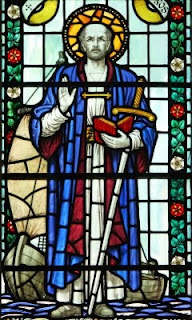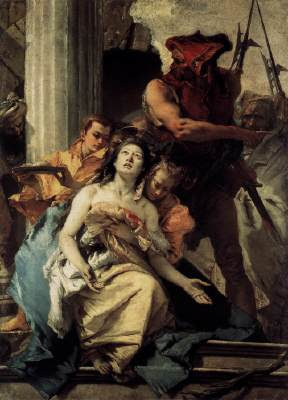The Holy Apostle Peter
"Blessed art thou, Simon Bar-Jona: because flesh and blood hath not revealed it to thee, but my Father who is in heaven. And I say to thee: That thou art Peter [in Aramaic, Kepha, which means rock], and upon this rock [Kepha] I will build my church, and the gates of hell shall not prevail against it. And I will give to thee the keys of the kingdom of heaven. And whatsoever thou shalt bind upon earth, it shall be bound also in heaven: and whatsoever thou shalt loose on earth, it shall be loosed also in heaven".
[Matthew 16:17-19]
The Lord chastises those whom he loves [Hebrews 12:6]. His loving corrections prepared St. Peter to shepherd His flock. It is often said that grace builds on nature. I think that is why our Lord chose St. Peter: the same characteristics that tended to get Simon Peter into trouble also allowed him to follow Christ whole-heartedly, and in time to preach the good news to a hostile world. Jesus did not build his Church on a timid man. (Or men. Most of the twelve died martyrs).
Peter trusted our Lord so thoroughly that perhaps even before he was Saint Peter, he was ready to walk on water at Jesus' command. After a few steps, he became frightened and began to sink. Our Lord chided him for his lack of faith, but I don't think anyone else is in a position to do so, unless he can stand with them on the water amid the waves and not sink.

Our Lord raises up the lowly [1 Samuel 2:8] and in the weakness of men manifests His strength [2 Corinthians 12:9]. He took a poor, uneducated fisherman from Galilee and over a period of years made him a holy man, a saint capable of miracles, the leader of the apostles after the Ascension.
St. Peter led the apostles in choosing a replacement for Judas Iscariot[Acts 1]. He was the first to speak to the multitude that gathered at the descent of the Holy Spirit at Pentecost[Acts 2]. He was the first Apostle to perform a miracle in the name of the Lord[Acts 3]. Filled with the Holy Spirit, he preached the good news to all the nation, even to the Sadducees who opposed him[Acts 4]. St. Peter pronounced Divine judgment upon the deceitful Ananias and Sapphira[Acts 5]. He traveled through Judea, Galilee and Samaria building up the Church[Acts 9]. He baptized Cornelius, the first gentile convert[Acts 10] and made the inclusion of gentiles in the Church acceptable[11:1-18]. An angel delivered him from imprisonment by King Herod Agrippa[Acts 12]. After his escape, he sent word to James and the other brethren who remained in Jerusalem, eventually returning there himself. There he spoke the deciding word against requiring gentile converts to observe Mosaic law[Acts 15]. He did not stay in Jerusalem. In subsequent missionary work, he spent some years building up the church in Antioch, he visited Corinth, and eventually he came to Rome. During the reign of the Roman emperor Nero, St. Peter was captured and sentenced to crucifixion. He did not deem himself worthy to die in the same way as his master. At his request, he was crucified upside-down.
St. Peter wrote two epistles which are recognized as Divinely-inspired and are part of the New Testament.
In all his labors he obeyed our Lord's commands to him to "feed my sheep" [John 21:15-17]) and to "strengthen thy brethren" [Luke 22:32].
Both eastern and western Catholics honor St. Peter and St. Paul on the 29th of June every year. St. Peter is also remembered by traditional Roman Catholics today (the Chair of St. Peter) and on November 18th (the Dedication of the Basilicas of Sts. Peter and Paul). Prior to 1960 we also honored him on August 1st (St. Peter's Chains). He had a feast day on the 18th of January which is now observed as the start of the Octave of Christian Unity.
1 Some insist that our Lord must have been referring to Peter's faith, or to the words Peter just spoke, or even that He switches in mid-sentence from speaking about Peter to speaking about Himself (and then back to St. Peter again in the next couple sentences). All these interpretations strain against the obvious play on words in Matthew 16, as even some protestant scholars recognize, especially in the context of our Lord giving St. Peter the keys of the kingdom of heaven. Even if our Lord had referred to Himself as the rock on which He would build His church, in the same breath using the same image for St. Peter would have only reinforced the message that St. Peter would truly be his chosen representative.
Some who wish to minimize the authority of St. Peter and his successors are fond of quoting St. Augustine's opinion later in life that it was Peter's confession of faith that was "the rock", not Peter himself. (Earlier in life St. Augustine said that St. Peter was the rock on which Christ built his Church. Peter means "rock"). But in that same quote, St. Augustine went on to say that Peter was the representative person for all the Church. Those who have separated themselves from Peter have separated themselves from the symbol of the unity of the mystical body of Christ.
Laus tibi, Domine, Rex æterne gloriæ.





